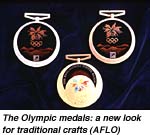
 |
 |

-
What are the Nagano Games medals like? Organizers of Olympic Winter Games are asked by the International Olympic Committee to come up with gold, silver, and bronze medals that are distinctive to each host country. This is something that doesn't happen at the Summer Games, whose medals have to conform to detailed IOC regulations covering size, thickness, material, and design.
The medals at Nagano will be lacquered, reflecting Nagano's position as a center of lacquer production in Japan. The medals at the 1992 Albertville Games, incidentally, were made partly with crystal, and those at Lillehammer in 1994 used stone.
On the lacquered side of the Nagano medals will be a silhouette of Nagano's majestic peaks, the Olympic symbol, and the Nagano Games emblem. The reverse side, which is made using cloisonne (a kind of enamel) techniques, is a lacquered circle depicting the rising sun.
Some 20 artisans are contributing their special skills in creating different parts of the medals. Each medal goes through 23 separate production stages, the final one being the application of the gold, silver, and bronze outer frame. Some 500 medals will be produced in all.
The letters and images on the medals are being produced by a high-precision equipment manufacturer headquartered in Nagano. The medals are a beautiful fusion of traditional craftsmanship and leading-edge technology.
